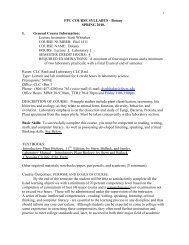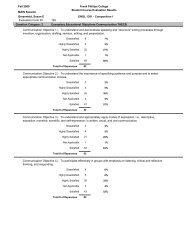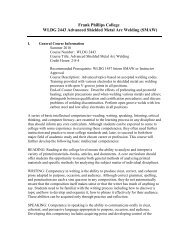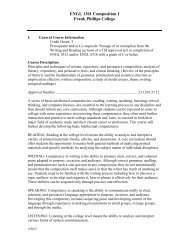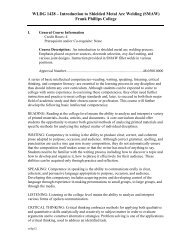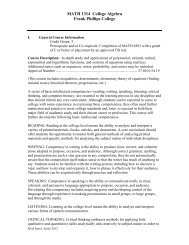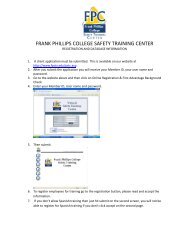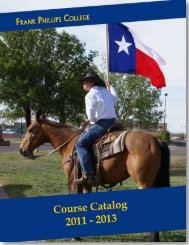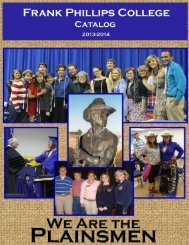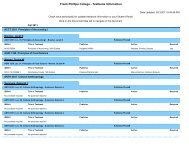Summer 2010
Texas Government - Frank Phillips College
Texas Government - Frank Phillips College
- No tags were found...
Create successful ePaper yourself
Turn your PDF publications into a flip-book with our unique Google optimized e-Paper software.
1<br />
Frank Phillips College<br />
Government 2306 Internet<br />
<strong>Summer</strong> <strong>2010</strong><br />
I. General Course Information<br />
INSTRUCTOR: Jeff Hubbard<br />
CONTACT INFORMATION:<br />
E-mail Address: jhubbard@fpctx.edu<br />
Telephone: Office-806-457-4200, Extension 773.<br />
Office Location: CLC 27b<br />
Mailing Address: PO Box 5118, Borger, TX. 79008<br />
Course: GOVT 2306, American Government II (STATE) Texas State and Local<br />
Government, 3 Credit Hours. Prerequisite: Passage of Reading Section of TASP test<br />
Course Description: Introduction to the theory and practice of politics and government<br />
in America at the national, state, and local levels, with special attention to Texas. Topics<br />
include political theory, the American and Texas constitutions, federalism, political<br />
participation and elections, the institutions of government, and domestic and foreign<br />
policies.<br />
More specifically, this course is an introduction to Texas state and local government. The<br />
course includes an introduction for understanding state and local and politics, the<br />
constitutional basis for Texas government and politics, the processes of Texas<br />
government and politics, the institutions of Texas government and politics, and the<br />
policies of Texas government and politics. Topics include political theory, state<br />
constitutions, federalism, political participation and elections, the legislature and<br />
legislative process, the state executive and the bureaucracy, the judiciary and judicial<br />
process, state budgeting and fiscal policy, state services, and local government functions,<br />
services, and structure.<br />
A series of basic intellectual competencies--reading, writing, speaking, listening, critical<br />
thinking, and computer literacy--are essential to the learning process in any discipline and<br />
thus should inform any core curriculum. Although students can be expected to come to<br />
college with some experience in exercising these competencies, they often need further<br />
instruction and practice to meet college standards and, later, to succeed in both their<br />
major field of academic study and their chosen career or profession. This course will<br />
further develop the following basic intellectual competencies:<br />
READING: Reading at the college level means the ability to analyze and interpret a<br />
variety of printed materials--books, articles, and documents. A core curriculum should<br />
offer students the opportunity to master both general methods of analyzing printed<br />
materials and specific methods for analyzing the subject matter of individual disciplines.<br />
WRITING: Competency in writing is the ability to produce clear, correct, and coherent<br />
prose adapted to purpose, occasion, and audience. Although correct grammar, spelling,<br />
and punctuation are each a sine qua non in any composition, they do not automatically<br />
1
ensure that the composition itself makes sense or that the writer has much of anything to<br />
say. Students need to be familiar with the writing process including how to discover a<br />
topic and how to develop and organize it, how to phrase it effectively for their audience.<br />
These abilities can be acquired only through practice and reflection.<br />
SPEAKING: Competence in speaking is the ability to communicate orally in clear,<br />
coherent, and persuasive language appropriate to purpose, occasion, and audience.<br />
Developing this competency includes acquiring poise and developing control of the<br />
language through experience in making presentations to small groups, to large groups and<br />
through the media.<br />
LISTENING: Listening at the college level means developing the ability to analyze and<br />
interpret various forms of spoken communication.<br />
CRITICAL THINKING: Critical thinking embraces methods for applying both<br />
qualitative and quantitative skills analytically and creatively to subject matter in order to<br />
evaluate arguments and to construct alternative strategies. Problem solving is one of the<br />
applications of critical thinking, used to address an identified task. Students will examine<br />
issues confronting state and local government.<br />
COMPUTER LITERACY: Computer literacy at the college level means the ability to<br />
use computer-based technology in communicating, solving problems, and acquiring<br />
information. Core-educated students should have an understanding of the limits,<br />
problems, and possibilities associated with the use of technology, and should have the<br />
tools necessary to evaluate and learn new technologies as they become available.<br />
Students will use CAMS as a supplement to classroom instruction and the internet, as<br />
well as newspapers, to provide current information concerning state government and<br />
issues.<br />
2<br />
II.<br />
Student Learning Outcomes<br />
All Frank Phillips College courses required in the Associate in Arts and Associate in<br />
Science programs work together to meet the following student learning outcomes:<br />
1. Establish broad and multiple perspectives on the individual in relationship to the<br />
larger society and world in which he or she lives, and to understand the<br />
responsibilities of living in a culturally and ethnically diverse world;<br />
2. Stimulate a capacity to discuss and reflect upon individual, political, economic,<br />
and social aspects of life in order to understand ways in which to be a responsible<br />
member of society;<br />
3. Recognize the importance of maintaining health and wellness;<br />
4. Develop a capacity to use knowledge of how technology and science affect their<br />
lives;<br />
5. Develop personal values for ethical behavior;<br />
6. Develop the ability to make aesthetic judgments;<br />
7. Use logical reasoning in problem solving; and<br />
8. Integrate knowledge and understand the interrelationships of scholarly disciplines.<br />
2
All Social and Behavioral Science courses strive to meet the following Exemplary<br />
Educational Student Learning Outcomes as identified by the Texas Higher Education<br />
Coordinating Board:<br />
1. Employ the appropriate methods, technologies, and data that social and behavioral<br />
scientists use to investigate the human condition;<br />
2. Examine social institutions and processes across a range of historical periods,<br />
social structures, and cultures;<br />
3. Use and critique alternative explanatory systems or theories;<br />
4. Develop and communicate alternative explanations or solutions for contemporary<br />
social issues;<br />
5. Analyze the effects of historical, social, political, economic, cultural, and global<br />
forces on the area under study;<br />
6. Comprehend the origins and evolution of U.S. and federal systems, with a focus<br />
on the growth of political institutions, the constitutions of the U.S. federalism,<br />
civil liberties, and civil and human rights;<br />
7. Understand the evolution and current role of the U.S. in the world;<br />
8. Differentiate and analyze historical evidence (documentary and statistical) and<br />
differing points of view;<br />
9. Recognize and apply reasonable criteria for the acceptability of historical<br />
evidence and social research;<br />
10. Analyze, critically assess, and develop creative solutions to public policy<br />
problems;<br />
11. Recognize and assume one's responsibility as a citizen in a democratic society by<br />
learning to think for oneself, by engaging in public discourse, and by obtaining<br />
information through the news media and other appropriate information sources<br />
about politics and public policy; and<br />
12. Identify and understand differences and commonalities within diverse cultures.<br />
In addition, the following learning outcomes are specific to ***Government 2306 *** :<br />
1. Student will be able to define "politics" and identify the ways in which people use<br />
politics to achieve their goals.<br />
2. Distinguish and illustrate how the setting or circumstances of politics can affect<br />
outcomes.<br />
3. Demonstrate the collective action problems faced by the states that led them to<br />
willingly surrender some sovereignty to the national government.<br />
4. To identify the major components of the American and Texan political culture<br />
and analyze ways this culture influences decision making.<br />
5. Identify ways separation of powers and checks and balances influences decision<br />
making in the Texas system and differentiate between the federal system and the<br />
Texas state system and appraise those differences.<br />
6. Identify the roles of the three branches of Texas government.<br />
7. To study and analyze how Americans (and, of course Texans) gain political<br />
socialization.<br />
8. Be able to discuss what the effect of being a slave state has had on Texas politics.<br />
9. Compare and contrast the U.S. Constitution and the Texas Constitution. Explain<br />
not only what the differences are but to examine the reasons for those differences.<br />
10. State why Texas has been a one party state throughout most of its existence.<br />
Identify which party dominated for more than a century following the Civil War<br />
3<br />
3
and examine the reasons why the state transitioned to the other party in the late<br />
twentieth century.<br />
4<br />
III. Textbook and Other Required Materials<br />
Texas Politics, 10 th Edition<br />
Kraemer, Newell, and Prindle Authors<br />
Wadsworth Cengage Learning 2009<br />
Choosing Civility<br />
P. M. Prindle, Author<br />
St Martin’s Press 2002<br />
There may also be occasional handouts to supplement the textbook. The internet,<br />
television, radio, films, newspapers, and current periodicals will also be valuable<br />
resources in this course. CAMS will also be used to provide supplemental learning<br />
resources to students. Students must also access class information through the student<br />
portal at the FPC website, www.fpctx.edu<br />
IV. Classroom Policy and Instructor Expectations<br />
Each student is strongly encouraged to participate in class discussions. In order to foster<br />
inquiry and ensure academic freedom, we will all respect the views of others when<br />
expressed during such discussions. Although this is essentially a lecture-oriented<br />
course, class meetings are always more productive when the students ask questions,<br />
interject comment, express opinions, and, in general, contribute to the learning process.<br />
In addition, borderline grades may be affected by student's class attendance, participation,<br />
and effort.<br />
Cell Phone Procedure:<br />
Cell Phones and Other Electronic Devices Procedure: Cell phones and electronic devices<br />
in the classroom create a distraction for both students and faculty. Cell phones are also<br />
considered suspicious during test taking. Therefore, Frank Phillips College outlines the<br />
procedure for handling cell phone usage in a classroom as follows:<br />
1. First Offense: the student will be warned verbally by the instructor to turn off<br />
the cell phone or electronic device or by appropriate administrative personnel at<br />
distance sites. The instructor will make a notation of the infraction.<br />
2. Second Offense: the student will be asked to leave the class period for the day<br />
and will receive zeros for any work done in class on that day; a student receiving<br />
instruction through remote connection at an off-campus site will be required to<br />
attend the class face to face in Borger from this class date forward.<br />
3. Third Offense: the student will be administratively withdrawn from the class in<br />
which the infraction occurred and will receive no refund for the class.<br />
Students should leave the college’s main number with an appropriate contact in case of<br />
an emergency.<br />
4
Academic dishonesty: Don’t cheat, DO NOT PLAGIARISE. Cheating or plagiarism<br />
will result in an automatic zero on the assignment, test, or project plus any additional<br />
action deemed appropriate by the instructor, up to and including an “F” for the course. It<br />
can also result in the student being turned in to the Dean of Student Services and may<br />
result in being dropped from the college. Just remember to do your own work!<br />
5<br />
Academic dishonesty includes (but is NOT limited to) the following offenses:<br />
1. Claiming as your own work a paper written by another student.<br />
2. Turning in a paper that contains paraphrases of someone else's ideas but does not<br />
give proper credit to that person for those ideas.<br />
3. Turning in a paper that is largely a restatement in your own words of a paper<br />
written by someone else, even if you give credit to that person for those ideas.<br />
The thesis and organizing principles of a paper must be your own.<br />
4. Turning in a paper that uses the exact words of another author without using<br />
quotation marks, even if proper credit is given in a citation, or that changes the<br />
words only slightly and claims them to be paraphrases.<br />
5. Turning in the same paper, even in a different version, for two different courses<br />
without the permission of both professors involved.<br />
6. Using any external source (notes, books, other students, etc.) for assistance during<br />
an in-class exam, unless given permission to do so by the professor.<br />
Learning Disabilities: If you have learning or any other disability, you must inform me<br />
at the beginning of the semester. Once it is documented with Student Services, we will<br />
make the necessary and allowable accommodations<br />
V. Methods of Evaluation<br />
Students will take a mid-term exam and a final exam. ALL reading material and ALL<br />
lecture material will be fair game in the exams. These exams may combine objective and<br />
essay questions. There will be writing assignment during the semester. There are 15<br />
chapter quizzes that will be taken during the semester according to the schedule<br />
established by the professor.<br />
Grading: Grades will be determined as follows:<br />
Final Exam 30%<br />
Mid-Term 25%<br />
Assignments 10%<br />
Quizzes 25%<br />
Participation (online forum) 10%<br />
All written reports will be typed in 12 point font and either one and one-half or double<br />
spaced. Handwritten reports will not be accepted. Homework assignments must be either<br />
electronically submitted or turned in on hard copy before the beginning of the class in<br />
which they are due. Late homework assignments will not be accepted. Students must<br />
appropriately cite all sources used in written reports. Students will NOT be allowed to<br />
make up missed quizzes except in the case of approved FPC activity. Unless the<br />
instructor assigns a group assignment, all work is to be individual and students are not to<br />
5
share information or reports. Students who miss tests due to verifiable illness, verifiable<br />
family emergency, or approved FPC activities will have the opportunity to make up tests.<br />
Make up work is not available for students who choose to be absent for long periods of<br />
time. All students must take the mid-term exam and the final exam to complete the<br />
course.<br />
6<br />
Grading scale will be as follows:<br />
A 90-100%<br />
B 80.0- 89.9%<br />
C 70.0- 79.9%<br />
D 60.0-69.9%<br />
F Below 60%<br />
VI. Attendance Requirements<br />
Regular attendance is necessary for satisfactory achievement.<br />
Students will be excused from class without penalty when either representing the College<br />
in an approved activity or having an approved reason for not attending. Reasons for<br />
absences must be approved by the instructor, and these exceptions do not relieve the<br />
student of the responsibility of making up the missed work as designated. Excused<br />
absences must be documented prior to the class period missed.<br />
A request for an incomplete will only be granted under unusual circumstances. It is<br />
necessary for the student to confer with the instructor and make sure that all forms<br />
are filled out and submitted in a timely manner. If you have a problem, don’t just<br />
stop coming to class. Talk to me so that we can determine if there is a way you can<br />
complete all required course work in a timely manner. Students that receive an<br />
incomplete must finish all coursework by the required deadline. Remember, if you<br />
wish to drop, or withdraw, you need to do so officially.<br />
VII. Scans/Or Core Competencies That Will Be Addressed in the Class<br />
Resources:<br />
Allocates Time<br />
Allocates Money<br />
Allocates Material & Facility Resources<br />
Information:<br />
Acquires & Evaluates Information<br />
Organizes & Maintains Information<br />
Uses Computers to Process Information<br />
Interpersonal:<br />
Participates as a Member of a Team<br />
Teaches Others<br />
Exercises Leadership<br />
Negotiates to Arrive at a Decision<br />
Works with Cultural Diversity<br />
6
Basic Skills:<br />
Reading<br />
Writing<br />
Arithmetic<br />
Listening<br />
Speaking<br />
Thinking Skills:<br />
Creative Thinking<br />
Decision Making<br />
Problem Solving<br />
Seeing Things in the Mind's Eye<br />
Knowing How to Learn<br />
Reasoning<br />
Personal Qualities:<br />
Responsibility<br />
Self-Esteem<br />
Sociability<br />
Self-Management<br />
7<br />
VIII. Next Recommended Course in Sequence—If Applicable<br />
Students who have not already done so should take American National Government<br />
(GOVT 2305).<br />
IX. Correlation to Stated Mission Goals of Frank Phillips College<br />
A. Provide general college academic course for students who plan to enter senior<br />
colleges and universities with sophomore or junior standing.<br />
B. Provide a classroom setting conducive to learning.<br />
C. Provide, assist, and promote the use of learning resources in the classroom.<br />
D. Participate in and contribute to the democratic society in which we live.<br />
E. Acquire skills, facts, values, and attitudes necessary to function and contribute to<br />
our society.<br />
The arts and sciences courses at FPC not only help the student with the how but also the<br />
why of things of the world.<br />
X. Availability of Instructor for Student Assistance<br />
Prof. Hubbard<br />
CLC 27B<br />
jhubbard@fpctx.edu<br />
Ext: 773<br />
Office hours will be as follows: BY APPOINTMENT<br />
XI.<br />
Grievance Policy for Students<br />
If you have a dispute concerning your grade or policies in this class, it is your<br />
responsibility to FIRST contact the instructor, either by e-mail or in person, to discuss the<br />
matter. Should things remain unresolved after this initial contact, please follow the<br />
procedures described in the Frank Phillips College Catalogue on pages 45 and 46. In the<br />
7
vast majority of cases, the matter can be resolved at the instructor/student level, and<br />
learning to communicate your concerns in a civilized manner is part of the college<br />
experience.<br />
8<br />
8



